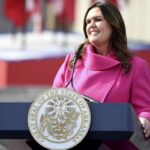
U.S. political “dysfunction” is hampering the country’s options to exploit Chinese President Xi Jinping’s vulnerabilities, according to the CIA chief.
“Even with all its ambition, even with all its expanding capabilities, and a really serious military modernization program, [China]’s not 10 feet tall,” CIA director Bill Burns said this week at the George W. Bush Presidential Center. “If we can get our own act together in this country, not just in terms of the economy, but in terms of our political system, overcome some of our own dysfunction sometimes, there’s every reason to think we have a better hand to play than the People’s Republic of China does today.”
Burns offered that remonstrance amid an acrimonious debate in Congress over supplemental defense funding for aid to Ukraine, a measure that hard-right House Republicans have stalled by threatening to oust Speaker Mike Johnson (R-LA) if he authorizes a vote on the bill. That dispute has unfolded even as a growing number of Republican lawmakers either resign or decline to seek reelection.
“Undoubtedly, the current dysfunction on Capitol Hill is distressing, but it almost always has been; we just didn’t see most of it,” Rep. Jake LaTurner (R-KS) said Thursday as he announced his decision not to run for office. “I remain optimistic about the future of this country, not only because we have overcome more significant obstacles in the past, but that the vast majority of people I have served with are good and trying to do the right thing, and because our founders, divinely inspired, understood human nature and created this republic to endure.”

Burns cautioned against overstating China’s advantages in comparison to the United States, despite the political tensions.
“President Xi faces a lot of domestic challenges — an economic recovery, an economic growth rate, which is not moving nearly as fast as he had hoped after COVID,” the CIA chief said. “A lot of challenges inside his own country right now, too. We should approach this competition with a certain amount of confidence.”
Still, the stalemate over aid for Ukraine has been watched with dismay in Kyiv and NATO ally capitals across Europe, where current and former officials fear the consequences of the war and anticipate that their U.S. counterparts will be even more distracted by domestic politics as the election year wears on.
“We all know that President [Joe] Biden will … focus entirely on the campaign trail [this fall] as, obviously, he must,” former NATO strategist Stefanie Babst told the Washington Examiner. “So how much political attention energy will there be? Not very much for other issues than the election campaign.”
Some U.S. allies in Europe are doing what they can to reinforce Johnson’s decision to hold a vote on the Ukraine aid.
“We are counting on Congress to make the right decision and approve the assistance package to Ukraine that it so urgently needs,” the speakers of parliament in the Baltic states — Lithuania, Latvia, and Estonia — wrote in a Friday letter to their American counterpart. “For the sake of standing up to tyrants and aggressors and for the sake of our collective security. Supporting Ukraine is an investment in our collective secure future.”
In parallel, U.S. and European officials are increasingly frustrated by China’s enabling of Russia’s invasion of Ukraine.
“When it comes to Russia’s defense industrial base, the primary contributor in this moment to that is China,” Secretary of State Antony Blinken said in Italy after a meeting of foreign ministers from the G7, the world’s seven largest industrialized democracies. “Now, if China purports, on the one hand, to want good relations with Europe and other countries, it can’t, on the other hand, be fueling what is the biggest threat to European security since the end of the Cold War.”
CLICK HERE TO READ MORE FROM THE WASHINGTON EXAMINER
Burns, for his part, suggested the U.S. “network of allies” would provide the decisive difference in the competition with China.
“China and Russia are lonelier countries — now, they’re working more closely together now than any time in my memory, and that’s a significant challenge for us,” Burns said. “But if we’re not complacent about our network of allies and partners, not only in the Indo-Pacific but in Europe and other parts of the world, that’s another huge asset that should enable us to compete very effectively with the People’s Republic of China over the next couple of decades.”






